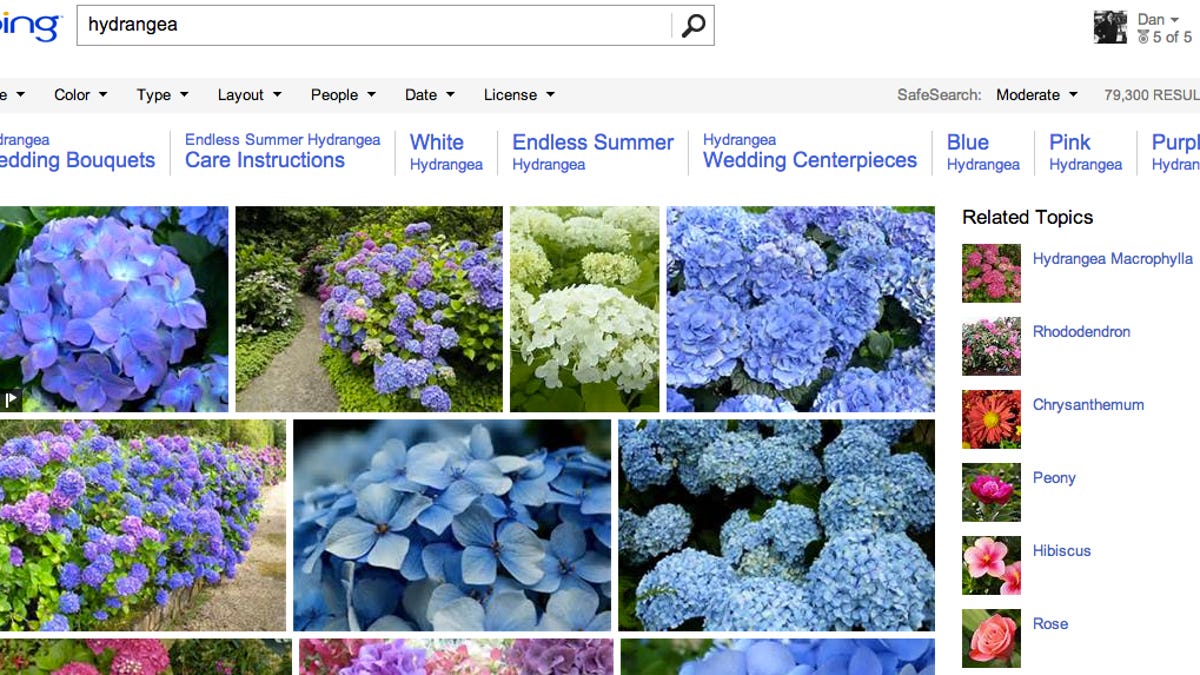The inside story on Bing image search
"After many years of investment by the Bing team, our search quality is generally just as good as anyone else, if not better," says Harry Shum, head of Bing R&D.

Bing, Microsoft's search engine, has been battling in the four years since launch to convince Internet users that it is worthy of their queries.
It has doubled its US share, from 8.9 to 17.9 percent in that time, according to ComScore, and it powers Yahoo search. But Bing hasn't been able to crack Google, which has remained the search king, with more than 65 percent US share.
With share comes more revenue, as well as more varied queries and click data to improve search engine results. But Microsoft's executives don't exhibit much of an inferiority complex, at least on the technical side.
"After many years of investment by the Bing team, our search quality is generally just as good as anyone else, if not better," Harry Shum, corporate vice president of Bing research and development, told CNET in an interview last week. He highlighted image search, which accounts for 10 percent of Bing queries, as an example where he contends that Microsoft does a better job than Google.
In a blog post on Friday, Microsoft compared Google and Bing image search for some queries, highlighting their different ways of defining results. For example, searching for "Prince Albert of Monaco" on Bing returns only pictures of the prince, whereas Google shows several pictures of the prince with other people. Bing assumes that the users' intent is to be shown pictures of the prince without any other people, and no duplicate pictures.
Bing determines likely user intent comes from mining Web clicks and social signals from across the Web and tapping into Microsoft's Satori database of the 20 billion objects to associate relevant entities with the queries, Bing senior director Stefan Weitz said in a video posted Friday explaining Bing image search improvements.
"We see what people are asking for and then the clicks, and use machine learning to extract signals out of that and improve the ranker," Shum noted.
However, Google search has far more queries per day and click data, which gives it an advantage in understanding user intent for a broader range of queries. Like Microsoft, Google has a massive semantic database -- Knowledge Graph -- to improve relevance and surface related information for queries.
Bing is also using computer vision, such detecting skin, faces and gender, to understand what's in a picture. "Using computer vision technology, we can see similar pictures, eliminate duplicates and bring in other images," Shum said. In addition, Microsoft is using neural network technology to better classify images, such as sunsets, tallest mountains, or Mickey Mouse.
While Bing trails Google in big data and market share, it likes to think it is prettier. The Bing homepage has stunning images, compared with Google's plain search box. And according to Microsoft, Bing's search results pages surface more related queries and topics, as well as more high resolution images than Google.
Bing Image Search
Google Image Search
Both Bing and Google search have a sophisticated auto-complete feature that suggests what you might be looking for as you type, which is an efficient way to refine queries on the fly.
Bing's pretty face lacks a voice, however, unlike Google Now and Apple's Siri, which understand enough natural language input to schedule an appointment or search for a restaurant based on your location and converse with you. With user permission, Google Now scans your e-mail, calendar, and other activities to anticipate your information needs, such as how long it takes to drive from work to your home or to alert you if there are changes in your airline reservation.
"We have had internal debates about when to ship something. We could come out with something now like them, but it wouldn't be state of the art. It's too constrained to be an agent now," Weitz told CNET last month. "We are not shipping until we have something more revolutionary than evolutionary."
For now, Bing will have to settle for being a prettier, less conversational face in the eyes of some beholders.

